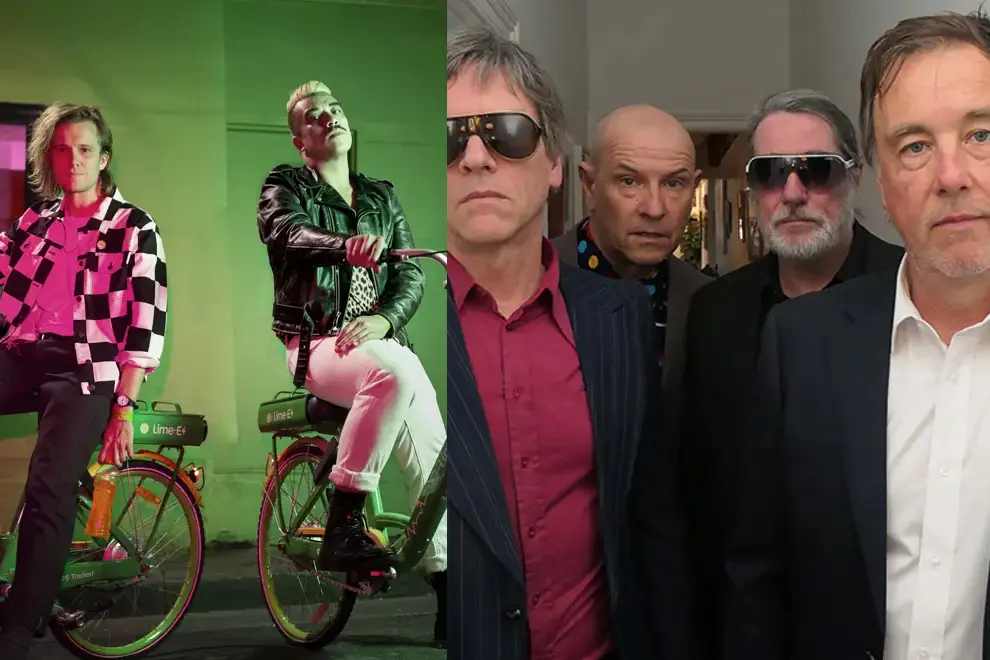 Liam Payne
Liam PayneJust over a month ago, the music world was rocked by the news that Liam Payne, who had risen to fame as a member of English quintet One Direction, had passed away at the age of 31.
A shocking loss to the global industry, the initially-unclear circumstances surrounding Payne’s untimely passing soon gave way to much rumour and speculation, including claims that his death was linked to claims he had been dropped by his label, Universal Music/Capitol Records, just days prior.
Though information regarding the incident is still becoming clearer as time goes by, Payne’s passing did however inspire conversations regarding the general wellbeing of artists.
In the UK, a Change.org petition was launched to “enact legislation to safeguard artists' mental health in the entertainment industry”, calling for what was deemed ‘Liam’s Law’.
Don't miss a beat with our FREE daily newsletter
“The entertainment industry, acclaimed for its glamour and stardom, is equally infamous for the enormous pressure it exerts on the mental health of artists,” the petition wrote. “Resultant issues such as stress, anxiety, depression, substance misuse and even suicide are alarmingly high. According to research, performers are 2-3 times more likely to suffer from these issues compared to the general population.
“The entertainment industry needs to be held accountable and be responsible [for] the welfare of their artists,” it added. “We seek to implore lawmakers to create legislation safeguarding the mental health of artists within the industry.”
Currently, the petition boasts more than 150,000 signatures, noting the proposed law would “necessitate regular mental health check-ups, adequate rest periods, and the presence of mental health professionals on-set, including any ongoing support during [artists’] career”.
It’s a noble cause, with artists the world over recognising the need for such resources dedicated to artists – especially those of Payne’s stature. However, it's important to remember the impact that decisions from an artist’s label, their management, or even their PR can have upon the mental health of an artist, or those who work closely with them.
In Australia, the likes of Support Act are thankfully on hand to aid artists who may find themselves struggling. Described as “music industry’s charity”, Support Act provides vital services to musicians, managers, crew, and music workers across all genres who are unable to work due to ill health, injury, a mental health problem or other crises.
Speaking to TheMusic, Support Act’s Wellbeing Content and Programs Lead and psychologist Dr Ash King explained that ultimately, while the music industry is one that exists to make money – and therefore one which signs and drops artists as finances dictate – it’s important not to forget the human aspect of the equation.
“Any decisions that neglect to consider that the artist is a human being, and not just a music-making robot,” King explains. “As humans, we ebb and flow in regards to energy, motivation, creativity; are impacted by things happening in our world and environment such as our relationships, current affairs, challenges and unexpected events; and things inside our body, such as health challenges, illnesses, neuropsychological diversity, etc.
“Often the pressures and expectations thrust upon working artists do not offer much consideration for these changing and impactful dynamics.”
In recent decades though, the rise of available resources for artists have made the ability to craft an independent career much more viable, thus – in some cases – removing the historical need for labels, management, and the associated red tape that may come with it.
As a result, more artists might find themselves in charge of their own careers, or – as King notes – including people in their teams like “friends and family members who might be more compassionate and understanding to their humanness”. On one hand, this can remove the business-like nature of the music-making caper, but can now simply shift stressors as decisions now affect those close to the artist.
However, recent decades have also seen a greater spotlight shone upon the need for mental health resources in the music industry. But the question then becomes, has the industry actually developed a sense of compassion for the artists who make them money, or is it still predominantly focused on the bottom line?
“There is often a tension between existing in a capitalism-driven, money-making structure and maintaining the self-care lifestyle features that allow us to feel good in our lives, communities and relationships,” King explains.
“Some industries pose more challenges in this regard than others, and the music industry is one of them – given its uncertainty and instability, insecurity and lack of safety nets, gruelling recording and touring schedules, and how much artists in particular are open to public scrutiny.
“I hope that the grim track record of mental health challenges, including substance-use struggles and high-profile suicides from successful and well-established artists reveal that, even at the very top, the demands and pressures of being an established artist come at a severe cost,” she adds. “More needs to be done to make sure that the industry is nurturing and supporting the wellbeing of the artists who are the one's giving us the music.”
One group who have had experiences with the ups and downs of being signed in the music industry are Polish Club. Having formed a decade ago in 2014, Polish Club released their self-titled EP in 2015 as an independent act, before signing to Island/Universal for four albums between 2017 and 2022.
Earlier this year, the group returned with their single Manila, which was their first after a rather difficult period. On the positive side, both David Novak and John-Henry Pajak each got married, while the less-than-stellar side of things saw Novak undergo open heart surgery, and the band leave their major label and move into self-managed territory.
Any musician would undoubtedly tell you it’s a difficult undertaking to assert yourself as an independent artist, but Polish Club’s gamble has undoubtedly paid off. Alongside well-received music and well-attended shows, their latest album, September’s Heavy Weight Heart, hit #16 on the Australian Artists Album Chart – four places higher than their last effort while on a major.
As Polish Club note though, the experience of leaving their label was comparatively easy due to the amicable nature of their departure.
“It was clear that we were coming to the end anyway,” they explained. “We were pretty keen to go our own way and make our own creative decisions. Label guidance became light touch, but in the past it was a little bit of a sticking point.
“We also have done a lot of our own marketing and promo in the past so we felt comfortable on our own. We are also at a point in our careers where we can generate enough income to fund the band through mostly merch and ticket sales.
“The tough thing for us was the break up with our management at the same time,” they noted. “Leaving the label and going independent meant that we needed to set up a new independent infrastructure, and losing management made it a steeper learning curve for us.
“We really needed to dig around more and figure out what we needed. It was a lot of work doing all of that at the same time, but we now find ourselves in a sustainable and fully autonomous position because of it.”
While the band still had their publisher and booking agent who had been there since the beginning, other avenues for advice were limited. In fact, “literally no safeguards” exist within the music for artists seeking help save for those already close to you.
However, the result was a positive one, with the band’s continuing success coming about as a result of their devoted fanbase who managed to help them weather any form of upheaval that may have experienced.
“Our first manager always banged on about how important it was to engage with your 100 or however many most fervent fans,” they note. “This is probably the most sage advice we’ve ever had (thanks Quincy).
“They’re the ones who will stick with you regardless of what you decide to do creatively. They are in for the long haul journey and if you treat them with the respect and candour that they deserve, they’ll be the lifeblood of your creative pursuit.
“Our hardcore fans have always known the way to support us was by buying tickets to shows, vinyl records and T-shirts,” they added. “I think anyone who supports local music is aware that streaming doesn’t amount to anything for an artist.”
Polish Club’s success, however, is at odds with the way the industry appears to be set up, with very little mind continuing to be paid to the mental health of artists who are creating value for labels and the wider industry.
“The industry is still milking artists for as much as they possibly can, and as long as that is the standard then you can count on mental health problems to persist, if not grow,” Polish Club note.
“As long as those who hold the balance of power, be it major labels, streaming services or any monopoly, are incentivised first and foremost by the capitalist pursuit of making their bottom line go up in perpetuity, then the artist will forever remain at the bottom of the chain. It’s just the way we’ve set up most industries.”
Though Polish Club have had the experience of going independent in the modern age, another Australian act who have experienced the dreaded split from a major label in decades gone by is Melbourne outfit The Fauves.
Having formed in 1988, The Fauves’ output is prolific and critically-acclaimed, though they’ve never been a major chart success. In 1993, they released their first album under Polydor, with their biggest critical accomplishment coming by way of 1996’s Future Spa.
Featuring singles like Self Abuser, Don’t Get Death Threats Anymore, and Dogs Are The Best People, The Fauves were triple j favourites, and even scored a nomination for Best Adult Alternative Album at the 1997 ARIA Awards.
In 1998, they released Lazy Highways, which peaked at #52 on the Aussie charts and ultimately served as the end of their relationship with Polydor.
“The writing was on the wall for our relationship with Polydor when the shooting of a video for [our single] Kickin' On was cancelled one day out,” the band later wrote on their website. “There could be no other conclusion than that they had decided to stop throwing good money after bad.”
As guitarist and vocalist Andrew Cox explains, the experience was a confronting one, but one they had a feeling was on the way well before it occurred.
“We had a lot of trouble with our record label, we didn't really get along that well,” he explains. “Primarily because we couldn't fulfil their dreams of major label level sales.
“But you have a lot of infrastructure around you when you're on a big label; a lot of people taking care of a lot of things, promo, all sorts of things, and to suddenly be saying, ‘Wow, we’re out, who's going to pay for us to make our next record?’, it was really, really confronting.
Following the release of Lazy Highways, Polydor was bought out by Universal, with the decision to let go of some of the less-than-major acts coming with it.
“That sort of thing never comes without layoffs, and some of the people who worked with us were getting laid off as well,” Cox says. “So we got the feeling that we were going to be axed.
“We were very lucky that around that time we were approached to do a couple of songs for this super obscure Australian movie called Bigger Than Tina and we did two songs for it and one of them got a lot of play on triple j.”
The result was enough momentum for the band to reconnect with David Williams, then-head of Shock Records, who had put out the band's early EPs.
“If David hadn't taken us up, I don't think any other label would have been interested in us,” he adds. “I think that's as close as we got to really staring into the abyss of our band's mortality around that time.”
Though Cox admits The Fauves were lucky to find themselves in a position with which to connect with another record label so quickly, other artists who may have found themselves in a similar position may well have found themselves at the end of their career.
These days, Cox says, artists are undoubtedly in a much better position with which to turn themselves into independent artists thanks to the widely available resources which didn’t exist in 1998.
“Back then, whether or not it was true, you thought there was just one way to make a record and that was to check into a $1,000-a-day studio for two weeks and make the record that way,” Cox says. “I mean, we couldn't countenance that there would be any other way that we could do a record.
“Now you can do it at home virtually for free, and in terms of promoting it, there's a big thing called the internet, which wasn't around then,” he adds. “Those two factors alone, just the ease of recording and the ability for people to access the means of recording and the ability for people to access the means of promoting their record or making people aware that it's out, neither of those things existed really when we were dumped back in the late ‘90s.
“I don't think it's ever nice to be rejected in that way,” he concludes, “But I think there are a lot more avenues now, for sure, that you could use as momentum to sort of keep going.”
Ultimately though, one of the biggest questions that arises is in regard to what can be done to better protect our artists?
On one hand, any musician who gets involved with a label – be it large or small – is aware of the contractual obligations they have as an artist, and are aware that any business deal can be terminated should their efforts prove financially lucrative.
However, there is a human element which should never be overlooked, and nuances which extend beyond the contractual agreements which should be considered. So, what can the industry be doing better to ensure that our artists are continuing to be their best?
“Acknowledge the importance of diet, exercise, rest and recovery,” King notes. “Encourage artists to nurture their social and personal relationships, not just those that are contingent on one's work within the industry. Make sure artists are paid adequately, and educated and supported in regards to their financial wellbeing.
“Invite artists to understand their own unique needs, boundaries and preferences that serve to support their long-term health and vitality, and respect artists when they advocate for themselves.”
King also notes that Support Act offers a large amount of support and services for Australian artists and music workers who may find themselves struggling, including their Wellbeing Helpline, Crisis Relief Grants, and their Healthy Workplaces Program.
For Polish Club, the answer of what can be done to take care of artists is relatively simple; start treating work in the arts as real work.
“Start treating making art like a real career instead of viewing it with disdain,” they urge. “People see it as a hobby, as something you should feel lucky to be allowed to do. You don’t dare speak of wanting to make a career or sustain it with earning an income. You should just be happy to be here. That’s bullshit.
“We need a better streaming deal. We need cheaper touring,” they add. “We need more venues. We need to value our art and invest in the making of it.”
Undoubtedly though, most artists will find themselves struggling at some point, and while the likes of Support Act do offer numerous resources, Polish Club note that there are numerous methods that artists can take to assure their success and to alleviate any potential issues.
“Talk to people about it, we are all in the same boat,” they explain. “Focus on doing it for the love and enjoyment of it first. Know your strengths. Don’t sit on your demos forever, actually release your music. Have a back up plan. Find someone to collaborate with. Lean on those who believe in the project and vision.
“DO NOT SIGN A FIVE RECORD CONTRACT AND GIVE AWAY YOUR MASTERS. Play live as much as possible. Don’t worry too much about making shitty little videos for people online. Read every contract and get someone else to read it too.”
As The Fauves’ Andrew Cox points out, part of what sets the music industry apart from others is indeed the lack of support that those who operate within it receive. To many, this might seem like a feature rather than a bug.
“I think it's always going to be a wild west industry on some level,” Cox says. “You can work in various other sectors and you might have the option to be part of a union, there might be various associations, and there might be other resources.
“The thing about the music industry, in some ways it’s sort of the appeal that it's just like going into the casino with all your money and just putting it on red on the roulette wheel,” he adds. “There’s just not really any way you can prevent any fallbacks.
“The music industry is just a conservative politician’s dream because it’s so completely deregulated.”
As Cox notes though, part of the issues that many artists – especially young artists – face is due to a general level of immaturity they face as a result of being held up to such heights by the music industry itself, and leaving them without any sort of guidance on how to deal with fame and fortune at any stage of their career.
“If you look at somebody like Liam Payne who'd been in One Direction and the staggering levels of fame and adulation,” he notes. “I don't think as humans we're really set up for that.”
“I kind of like the fact that the music industry is just because it's really the most vainglorious thing to ever step up and say, ‘Hey, I've got this music and I think it's good enough for people to want to listen to’, and, to say ‘I'm going to go and become a popular musician’,” he adds.
“The world doesn't really need you to do that, you know? The world needs nurses and doctors, but they don't really need you and your band. But I'm coming from a position where I'm 57 years old, so obviously it's a lot different to being 18 years old and famous.”
Whatever side of the fence you’re on, it’s clear that taking care of our artists and their mental health is the first step to ensuring a future that is both bright and full of music for years to come.
















